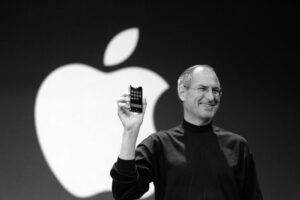
Sounds like a sensationalistic headline, but if you read Morgan Stanley‘s latest series of reports on the Mobile Internet, you’ll walk away with the same impression.
Morgan Stanley’s global technology and telecom analysts documented the rapidly changing mobile Internet market to provide a framework for emerging trends and direction.
To set the stage, Morgan Stanley forecasts that the mobile Internet market will be at least 2x the size of desktop Internet when comparing Internet users to mobile subscribers.
According to the report, Apple’s iTunes + iPhone/Touch ecosystem has created what “may prove to be the fastest ramping and most disruptive technology product / service launch the world has ever seen.”
For marketers, Apple has reset the market by empowering brands and developers to mine an entirely new channel to reach existing and potential customers, advocates, and influencers. You can expect to see brands increasingly exploiting popular apps as well as creating branded experiences in the Apple, Android and eventually in the Microsoft, BlackBerry, and Palm platforms as well. VW’s launch of its new GTI exclusively on the iPhone and iPod Touch as an app was as groundbreaking as it was telling.

Morgan Stanley also predicts that smartphones will out-ship the global notebook + netbook market in 2010E. And, smartphones will also out-ship the global PC market (notebook + netbook + desktop) by 2012E. Driven primarily by 3G and a rich ecosystem of anytime, anywhere wireless capabilities, many consumers are finding their mobile online activity rise dramatically due 24×7 access to ‘cloud-based’ content and applications.
In reviewing the report, it appears that consumer usage of wireless data (including video + images + content + communications) continues to grow rapidly and this growth is expected to run its course for the foreseeable future. In addition, Morgan Stanley sees three platforms demonstrating especially strong momentum that combines consumer and developer adoption and interest.
1) Facebook (which is increasingly becoming a desktop + mobile communications hub);
2) Mobile (clearly led by Apple’s iPhone / iTouch / iTunes ecosystem)
3) The web (as online usage of products / services continue to gain share vs. offline counterparts and growing wireless usage expands market opportunities).
Social Networking Drives Growth
According to the report, Facebook represents the potential to serve as a communication platform and engine. With the smartphone, Facebook becomes a unified communications and multimedia creation tool and network that fits in your pocket and goes with you anywhere you go. While it already connects over 350 million users, Facebook’s market leaderships will extend as more consumers embrace more powerful mobile devices with video, photo, and high-speed wireless access. Also mentioned, and quite an interesting opportunity if you think about it, Facebook will offer easy and compelling voice and video chat functions and those capabilities will connect mobile and desktop users in new mediums and introduce new capabilities in the process.
Morgan Stanley views Facebook and Apple driving independent yet overlapping platforms that are forcing innovation in social and mobile connectivity and communications. Essentially, they are driving growth and ingenuity for one another while setting the stage for a new era of social networking.
Geo-Local and Augmented Reality
Similar to the recent Forrester report containing 2010 predictions for social computing, Morgan Stanley excluded Geo-local applications such as Loopt, FourSquare, and Gowalla as well as the bevy of Augmented Reality apps that are rolling out at an increasing pace.
Mobile does indeed symbolize the future of communication and collaboration, representing one-third of The Golden Triangle.
In addition, social and real-time (plus geo-local and augmented reality) applications will only fuel adoption and innovation, creating a bridge between online and offline interaction. Most important, the fusion of these technologies will fundamentally change how we communicate with one another as well as how we purchase products and services. Mobile Internet combined with geo-local and augmented reality applications and networks just may represent the last-mile in the ever-elusive local advertising and marketing markets.
Other key takeaways include:
Material wealth creation / destruction should surpass earlier computing cycles. The mobile Internet cycle, the 5th cycle in 50 years, is just starting. Winners in each cycle often create more market capitalization than in the last. New winners emerge, some incumbents survive – or thrive – while many past winners falter.
The mobile Internet is ramping faster than desktop Internet did, and Morgan Stanley believes more users may connect to the Internet via mobile devices than desktop PCs within five years.
Five IP-based products / services are growing / converging and providing the underpinnings for dramatic growth in mobile Internet usage – 3G adoption + social networking + video + VoIP + impressive mobile devices.
Massive mobile data growth is driving transitions for carriers and equipment providers.
Emerging markets have material potential for mobile Internet user growth. Low penetration of fixed-line telephone and already vibrant mobile value-added services mean that for many EM users and SMEs, the Internet will be mobile.
Read the Full Reports
The Mobile Internet Report Setup – 92-slide presentation
The Mobile Internet Report Key Themes – 659 slide presentation
The Mobile Internet Report – 424 page report
Connect with Brian Solis: Twitter, LinkedIn, Tumblr, Facebook
—
Pre-order the next book, Engage!

—
Click the image below to get the current book, poster, or iPhone app:



—
Image Credit: Shutterstock










This is a huge trend most marketers are only beginning to think about. Mobile technologies will finally connect digital to the real world, and brands who aren't thinking of the mobile context of their marketing activities will be left in the dust.
Indeed. While many see this as a “given,” the next step is transforming vision into action…There's time for everyone at the present moment.
Brian,
Thanks for the breakdown on the report. I'm going to dig into the reports this evening, but your short run breakdown is enlightening.
Does the report break down mobile adoption in other countries? One of my former companies did work in Africa and we found that the mobile market was exploding, while land based internet was lagging behind because of infrastructure issues. In fact many “third world” countries simply skipped a whole generation of internet and moved straight to mobile.
Are these slides available for others to use in presentations? With proper credit of course.
Doug
Hi Doug, thank you. The reports are incredibly detailed. So yes, many of your questions will be readily answered. Not sure about credits, but I'm sure you will find language around that on their page.
Wow!
This changes everything we think about — and how we think about it. Three years ago I read Ben Schneider's book Leonardo's Laptop and thought parts of it were way out there. Today we're closer to those uses than I ever dreamed.
I'm interested in what this means for the new disenfranchised — those people who can't read well enough to navigate the internet or who don't have the discretionary income to purchase a smartphone. How do we keep them from being left behind?
Laurie, interesting thoughts. I don't have an answer to that, only that things are moving in that direction…would love to see proactive ideas addressing this however.
Give me a day or two. 😉
Can I also point out that I use my iPhone to read books. This whole Kindle/iPad (as a reading device) craze is a little puzzling to me when you can easily download free books to your smartphone via Project Gutenberg (et al.). I just finished Anna Karenina and am now reading The Idiot. No nightlight, no oversized screen, just me and my phone and Tolstoy! Plus with the Kindle for iPhone app all the content for the kindle is available on my mobile! just sheer awesomeness
Hi Brian,, nice article but I can't ( or reading over it) see why mobile will be bigger than Desktop in five years time.
cheers AJ
Great article on the quick rise that mobile access will have on consumer product consumption. This will completely change how marketers interact and sell to consumers. I think Gen Y consumers had a big role in this change since cell phone ownership in teenagers skyrocketed in the past few years.
Brian,
Great sump of how things are headed where they are headed. Personally, I don't distinguish the difference between mobile and the desktop as the interface will eventually become secondary to the experience. All the content online is already on my phone.
Best,
Rich
Great insights! I can't wait to see what happens when the Smartphone market is more attainable for the average cell phone user. It's already made such an impact…imagine what will happen when the next generation of Smartphones comes out and the the others filter down to discounted prices. It will be a marketers dream come true, because a lot of companies will be scrambling to jump on…realizing it isn't just a field for the big players. Awesome! I love Social Media!
Love the comment Megan! Agreed…
Hello Mr. Solis,
I am a student who is following your blog as an assignment in my public relations class.
I just wanted to say that this report was very interesting to me. I must say that with technology becoming more portable and seemingly more necessary, the idea of “it's a small world after all” is previlent in my mind. I also would like to ask what you feel will happen to programs such as Skype once facebook opens up their voice and video chat application?
Hey Brian,
I completely agree with the fact the mobile internet market will eclipse the desktop market but I would feel uneasy betting when this is going to happen. I do know that currently there are roughly 4 times as many mobile phones in the world as PCs, and one out of every five phones are smart phones. Many do predict the number of smart phones will equal the number of data phones within five years. This would mean that there would be twice as many smart phones as PC's (assuming ratios dont change) within that timeframe.
Here are some interesting reports on the mobile market and trends:
MMA Forecasts 2010 Trends: http://www.prnewswire.com/news-releases/mobile-…
Mobile Trends 2010 for Asia: http://www.cxotoday.com/India/News/Mobile_Trend…
Hi Brian!
I think that this information really shows how social media is taking over. A lot of more traditional people seem to think that social media outlets such as Facebook and Twitter will fade out, but I see them only becoming more and more useful in the future.
One thing that I don't think was touched on enough was the importance and the large roll that geo-media is playing in the world of social media. Foursquare alone has begun to play such a huge roll in social media that different businesses have begun to use it as a competition and way of interacting with their customers.
This information though really does break down social media in an almost scientific way, which will hopefully make the rules and importance of social media more clear to people who have not yet caught onto the social media trend.
I look forward to reading more posts –
Paige Soucie
Interesting preview given here.
This developments are of course true for the US. But think further ahead. Take Africa as an example: The mobile phone is already used for banking, payment, messaging etc. due to the lack of infrastructure. A whole continent waiting to get access.
In Europe the run for mass smart phone use has also just begun.
As you mention high-speed wireless access will determine how fast this will happen.
This is a real challenge – but an interesting one! There are still people in branding, from a TV / traditional media background, reluctancly, “doing” new media (i.e. Facebook, Twitter, and so on on the web). Whilst others aren't just marketing via traditional media and the (desktop) internet but are now experimenting (and much more) with mobile internet. The bar's been raised again ..
Great article on the Mobile Internet Market by @BrianSolis
Brian, these details are astounding! I think back to a few years ago when ringtone purchases were first made available via your phone….its turned into a multi-million dollar business. It seems the shift from traditional marketing to social and desktop computing to mobile has become a powerful force most would have had a difficult time predicting 5 years ago. Love your content, keep it up.
Brian,
FYI, Cisco will announce new insight about the Mobile Internet market opportunity (including the latest VNI market study results) at an upcoming webcast – details are here http://bit.ly/mobile-internet
On college campuses this is becoming the new norm as well. I hardly see any laptops. iPhones and other smart phones are dominating the classrooms. I won't forget last semester when my instructor was getting mad at students for texting and one of them replied “I'm not texting… I am taking notes then emailing them to myself.” The teacher was shocked and it made me realize that the standard of laptops might be changing very soon. Enjoy the post, very interesting information!
I would like to make a suggestion to what Laurie wrote-granted, this probably isn't the best answer…but it is interesting to think about. I think we are already leaving people out. There are people who either can't afford cell phones now, or are now just getting to the point where they can. I think we are always going to leave people out, which sucks, but its true. There are still a lot of people in the older generation who don't own a computer-don't even know how to use one. And some in younger generation who just don't have the capabilities to own one. Yet, they still stay up to date. For now, there will always be alternate forms of communication. But I will be interested to see how all the Kindle apps and other reading capabilities effect journalism and news.
I don't think that directly gives an 'answer' to your question, but it is something to keep in mind.
Because the portability everything is going mobile, that's a fact!
Been thinking about mobile / geo evolution for a while and also understand the importance of demographics / technographics and how a particular segment uses mobile. It's exciting to be a part of this industry evolving at warp speed. I'm a relative “elder” and often find myself alone in my adoption / acceptance / excitement about this environment. Great posts and insights.
Nice post Brian. Makes the digital sociologist (ethnographer) in me think about the coming ubiquity of digital research.
http://skilfulminds.com/2010/02/04/ethnography-…
Thanks Larry. I actually read that post and thoroughly enjoyed it! Nice Work!
To provide services to small organizations now we are proudly says that we have big corporate clients. We have a proven track record of servicing clients. laptops in pakistan
Here is the latest information on IPTVIPTV solutions from Cisco.
Oops…correction…IPTV solutions
I see that facebook is creating all kind of media tools available on earth.
Mike
Interesting preview